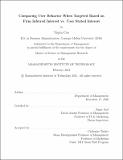Comparing user behavior when targeted based on firm inferred interest vs. user stated interest
Author(s)
Cao, Yiqun(Scientist in business management)Massachusetts Institute of Technology.
Download1251804617-MIT.pdf (1.567Mb)
Other Contributors
Sloan School of Management.
Advisor
Sinan Aral.
Terms of use
Metadata
Show full item recordAbstract
There has been a lot of discussions on giving user more control over their private information. Our paper wants to show how practices that give user more control over privacy, could facilitate collection of self-stated interest from voluntary users. This might potentially help firms to better understand users' true interests. The paper investigates the short run and long run impact of adopting the user stated interest into ad targeting, compared with targeting using firm inferred user interest. It also explores the side effects on user's overall app engagement and the possible mechanisms that associate users' action of stating interest with impact on their interest in ads and organic contents. Results show that on average users get more interested in ads immediately after the ad targeting adopts user stated interest categories. In the long run, however, not only does the effect diminish quickly, but there is also a lasting and significantly negative effect on users' overall app engagement, possibly because both organic content and ad targeting use the same user profile.
Description
Thesis: S.M. in Management Research, Massachusetts Institute of Technology, Sloan School of Management, February, 2021 Cataloged from the official PDF version of thesis. Includes bibliographical references (pages 41-42).
Date issued
2021Department
Sloan School of ManagementPublisher
Massachusetts Institute of Technology
Keywords
Sloan School of Management.